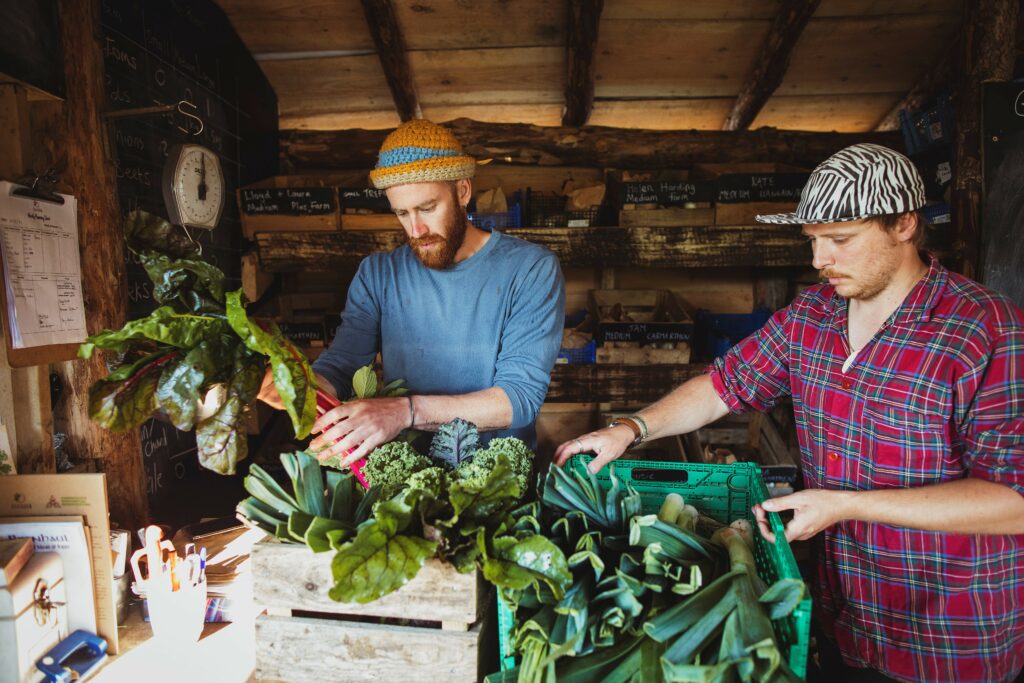Dr Angelina Sanderson Bellamy and Barbora Adlerova explain how community-supported agriculture can contribute to resilient communities in Wales.
Climate change, a global health crisis and the cost of living crisis pose existential threats to people in Wales, the UK and globally. In Wales, grassroots community food initiatives are a beacon of hope to reduce the effects of the multitude of crises and create more resilient local communities.
Community Supported Agriculture (CSA) is an agroecological model of small-scale food production that has producers, consumers and the planet at the core of their value system. They work with nature to produce food in a way that encourages on-farm biodiversity, builds soil health, and increases water retention which is critical during periods of both drought and heavy rainfall. CSAs have an equitable approach to food, with producers and consumers working together as partners in the food system. CSAs are a part of the community where they grow vegetables, and they are keen to make their produce available for everyone in their community, not just those who can afford it.
CSAs provide key non-food benefits to their communities by connecting people to each other and to the food they eat, where it was grown and the people who grow it.
The Covid-19 crisis highlighted the risk factors associated with an unhealthy diet and exacerbated years of increasing food insecurity. In response we launched the Accessible Veg project in Spring 2021, through which CSAs spoke about how some of their members were unable to continue paying for veg bags and how they were able to make alternative arrangements with these members so that they could continue to receive a weekly bag of healthy and fresh vegetables.
‘We developed a community fund that acts as a focus for the accessibility element of the scheme, through that we have engaged members in fundraising events with members helping to shape, organise and run the events.’ Slade Farm Organics
CSAs were eager to work with us further to co-produce solidarity models that would enable them to make weekly veg bags available for food-insecure households in their communities. Organisations implementing solidarity models put social and environmental concerns at the heart of their business model, prioritising them over profit maximisation.
Based on Accessible Veg research, CSAs provide key non-food benefits to their communities by connecting people to each other and to the food they eat, where it was grown and the people who grow it. Food-insecure households who joined a CSA and received a free weekly veg bag and regular membership communications experienced improved measures of well-being and food security:
‘It’s encouraged the children to, obviously, eat more veg, and they’ve been excited to see what comes on Thursday […] They’ve been really excited to try new things […] and they’ve wanted to come and volunteer as well down at the Farm, which we have done.’ CSA member
CSAs generate all of these benefits without the support of government subsidies that other, larger farms have traditionally received. We now find ourselves in a cost of living crisis, creating further financial pressures and increased well-being inequities among households. CSAs can play a key direct and mediating role within their communities to support all households to be able to access food, both making it physically available and financially accessible through the development of solidarity models.
Gofod i drafod, dadlau, ac ymchwilio.
Cefnogwch brif felin drafod annibynnol Cymru.
This is where the new Sustainable Farming Scheme in Wales has an opportunity to generate social impact that can positively affect health, food security, well-being and sustainability. Currently, the Sustainable Farming Scheme proposes to only finance farms that have more than three hectares in production. This would exclude many CSA schemes, which often operate on less than 3 hectares.
Food Sense Wales is calling on Welsh Government to create a new infrastructure grant scheme for small-scale horticulture in Wales that would result in speeding up the growth of the sector and leading to greater sales of veg across Wales.
Evaluation of a recent pilot study undertaken by Food Sense Wales has shown that small-scale investment can have a significant and positive impact on horticulture businesses, with sales of veg increasing on average by 74.5%. Based on this pilot, Food Sense Wales is calling on Welsh Government to create a new infrastructure grant scheme for small-scale horticulture in Wales that would result in speeding up the growth of the sector and leading to greater sales of veg across Wales.
We echo this call for support and add the following recommendations:
- The use of Healthy Start vouchers for veg bags and further pilot projects that interlink health, community, environment, and agriculture.
- Coordinating and funding links to existing Government policies. For example, using Welsh Government funding for poverty alleviation to support community-based food solidarity models or policies related to the Welsh Government’s Community Food Strategy.
- Funding commitment to provide long-term support for community-based initiatives and build consistent and stronger links to existing Government policies.
- Support and funding accessible to people that experience multiple vulnerabilities, often linked to poverty. Social prescribing and food vouchers that can be used towards CSA memberships can address both well-being and food insecurity.
As public health is a public good, community-scale supply chains could be approached using the ‘public money for public goods’ principle contained in the relevant Agricultural Bills across the UK and the Wellbeing of Future Generations Act (2015). This can create a source of long-term and secure funding for community growers, suppliers, distributors, and other organisations involved in local food provision services that result in improved environmental sustainability as well as positive public health outcomes. This policy approach can support a more diverse range of actors engaging in community-scale supply chains, generating more resilient consumption patterns that align with health, biodiversity, zero-emission policy targets and other non-food benefits.
__________________________
The Accessible Veg project worked with the following four CSA farms in Wales:
Find a CSA near you on the Community Supported Agriculture website here.
All articles published on the welsh agenda are subject to IWA’s disclaimer.





